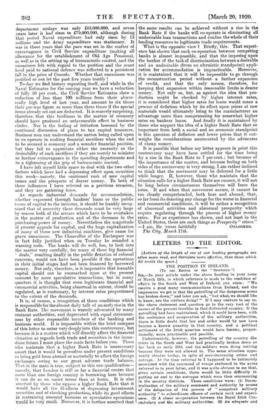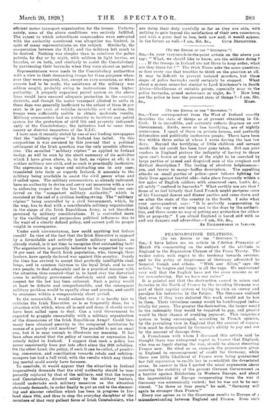LETTERS TO THE EDITOR.
[Letters of the length of one of our leading paragraphs are often more read, and therefore more effective, than those which fill treble the space.] TFIFI POSITION IN IRELAND.
[To THE EDITOR OF THE " SPECTAT0112]
SIR,—In your article under the above heading in your issue of March 13th, in which reference is made to the condition of affairs in the South and West of Ireland, you state : "We receive a good many communications from Ireland, and the impression we get is that the patrolling of the dangerous areas has broken down," and later you ask, "but what,we should like to know, are the soldiers doing?" If I may venture to say so, the above statement and question go to the very root of the causes of the present troubles in that distracted country. If the patrolling had been maintained, which it could have been, with the assistance and co-operation of the military authorities, there is little doubt that law and order would by now have become a known quantity in that country, and a political settlement of the Irish question would have become, propor- tionally, more practicable and possible.
Unfortunately, however, the patrolling of the country dis- tricts in the South and West had practically broken down as far back as early 1919, and the soldiers were doing nothing because they were not allowed to. The same situation appa- rently obtains to-day, in spite of ever-increasing crime and outrage. At the time referred to I happened to be intimately associated with the command of troops stationed in the areas referred to in your letter, and it was quite obvious to me that, given certain conditions, there would be little difficulty in putting an end to the outrages which were then commencing in the country districts. These conditions were : (1) Decen- tralization of the military oo-mmand and authority by means of the delegation of the powers of " competent military authority " to subordinate offieera of certain rank and experi- ence. (2) A closer co-operation between the Royal Irish Con- stabulary and the military authorities. (8) An adequate and efficient motor transport organization for the troops. Unfortu- nately, none of the above conditions was entirely fulfilled. The extent to which subordinate commanders were entrusted with the authority mentioned was altogether too limited, in spite of many representations on the subject. Similarly, the co-operation between the R.I.C. and the military left much to be desired. Nothing was simpler than to reinforce the police patrols, by day or by night, with soldiers in light lorries, on bicycles, or on both, and similarly to assist the Constabulary by garrisoning their barracks when they were absent on patrol.
Representations were made to the Constabulary authorities with a view to their demanding troops for these purposes when- ever they were required, but, except on rare occasions, or when arrests had to be made, the assistance of the military was seldom sought, probably owing to instructions from higher authority. A properly organized patrol system on the above lines would have ensured adequate protection in the country districts, and though the motor transport allotted to units in those days was generally inefficient to the extent of from 30 per cent. to 50 per cent. of vehicles invariably out of action, the troops were sufficiently mobile to obtain moderate results. Military commanders had no authority to institute any patrol system for the protection of civil life and property independ- ently of the Constabulary; the initiative had to come from county or district inspectors of the R.I.C.
I have seen it recently stated by one of our leading newspapers that the "military regime " in Ireland has failed. On this supposition it was assumed by this journal that a political settlement of the Irish question was the only possible alterna- tive. The so-called " military regime " as applied to Ireland to-day, as will be seen by the short summary of its activities which I have given above, is, in fact, no regime at all it is neither military nor civil, and as such is practically ineffective. The expression is a vague and misleading one in any ease; translated into facts as regards Ireland, it amounts to the military being available to assist the civil power when and if called upon. The military commanders, as already indicated, have no authority to devise and carry out measures with a view to enforcing respect for the law beyond the limited one con- ferred on the "competent military authority," which is exercised at the end of a civilian leading-string. The "military regime" being controlled by a civil Government, which, by the way, has to deal with a considerable military organization in the shape of the Irish Republican Army, is not therefore governed by military considerations. It is controlled more by the vacillating and purposeless political influences due to the want of a clearly defined policy, and cannot pull its proper weight in consequence.
Under such circumstances, how could anything but failure result? In view of the fact that the Irish Executive is opposed by a formidable and actively hostile military machine, as already stated, is it not time to recognize that outstanding fact? The organization is generally believed to be supported by some 70 per cent. of the South Irish population, who, through their leaders, have openly declared war against this country. Surely the time has arrived to accept that perfectly intelligible chal- lenge, and in common fairness to the loyal Irish, and to our own people, to deal adequately and in a practical manner with the situation thus created—that is, to hand over the disturbed areas to military government absolutely until such time as respect for the law has been enforced. Such a policy would at least be definite and comprehensible, and the consequent military problem would be equally clear and precise, and could be overcome within a comparatively short neriod.
In the meanwhile, I would submit that it is hardly fair to criticize the Irish Executive, as is so frequently done, for a situation with which, when all is said and done, it should never have been called upon to deal. Can a civil Government be expected to grapple successfully with a military organization of the dimensions of the Irish Republican Army? Could Ger- many have obtained security in the conquered territories by means of a purely civil machine? The parallel is not an exact one, but it is near enough to illustrate my meaning. It has been often stated that the policy of coercion or repression has utterly failed in Ireland. I suggest that such a policy has never consistently been put into effect since the 1916 rebellion. On the other hand, the policy, if such it can be called, of pander- ing, concession, and conciliation towards rebels and sedition- mongers has had a full trial, with the results which any think- ing mortal could surely have foreseen.
To conclude, it would appear that the situation in Ireland imperatively demands that the civil authority should be tem- porarily replaced by that of the military, and that the troops and Constabulary, directed solely by the military leaders, should undertake such military measures as the situation obviously demands, in order finally to put an end to the simmer- ing and sinister rebellion which has been in progress in Ire- land since 1916, and thus to stop the everyday slaughter of the members of that very gallant force of Irish Constabulary, who
are doing their duty manfully so far as they are able, with nothing to gain beyond the satisfaction of their own conscience, and with a great deal to lose, both now and, it would appear,
in the future as well.—I am. Sir, Sic., Cum Barrsioncess.





































 Previous page
Previous page